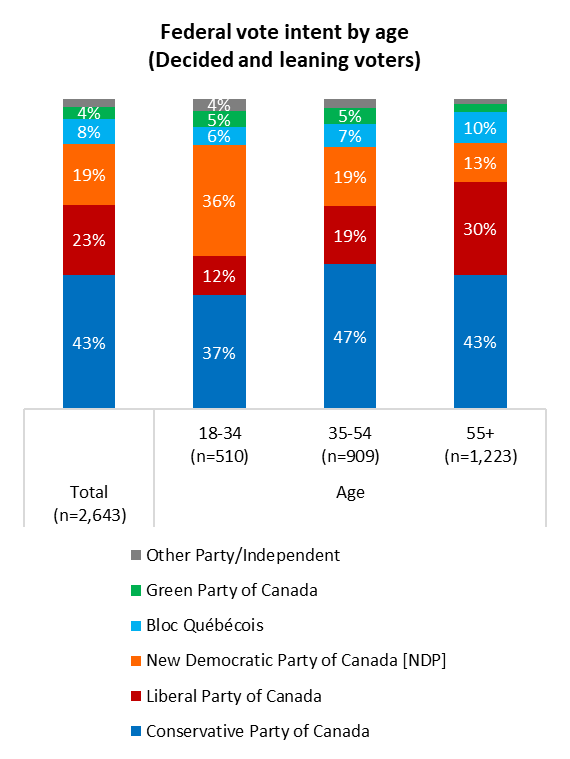NATIONAL PULSE – Liberals aren’t getting a bounce in wake of new budget
By ANGUS REID INSTITUTE
April 24, 2024 – A month-long political sales job by Prime Minister Justin Trudeau, his cabinet and caucus attempting to raise awareness and – crucially – support for a slew of budget spending measures aimed making life affordable for Canadians has yet to pay off.
In a bid to climb out of a 20-point deficit in vote intention, this year’s budget invested heavily in Gen Z adults and Millennials, loading $8.5 billion in spending on housing and other affordability measures, to woo Canadians under 40, while forecasting a nearly $40-billion deficit for the next fiscal year.
The problem? These key vote demographics do not appear to be picking up what the Liberals are throwing down. New data from the non-profit Angus Reid Institute finds Trudeau and the Liberals’ “generational fairness” budget has had no effect on the party’s electoral fortunes so far.
The opposition Conservatives lead the Liberals by a margin of nearly two-to-one (43 per cent versus 23 per cent) while the NDP are a not-too-distant third at 19 per cent. The Liberals are also the third choice among the Gen Z and Millennial voters they’re trying to win over, trailing both the NDP and CPC among those age cohorts.
However, this does not mean the budget’s measures are unpopular. At least seven-in-ten Canadians approve of the pharmacare (70%), dental care (73%) and Canada Disability Benefit (74%) included in the budget. Measures to address the housing affordability crisis – leasing out federally owned lands to build affordable housing (68%) and funding infrastructure such as pipes for new housing developments (65%) – are also popular.
At issue for many Canadians, though, is there is little belief that the budget as a whole will improve their personal financial situation, Canada’s economy, or the housing affordability crisis. In fact, a majority say the changes planned by the federal government will have a detrimental effect on these fronts instead.
Meanwhile, half (47%) of Canadians say they are more pessimistic about the future of their personal financial situation, and a majority (56%) say their outlook for Canada’s economy has grown more negative in the wake of the budget.

More Key Findings:
- Renters are more likely to park their vote with the Conservatives (34%) or NDP (31%) than the Liberals (18%) if an election were held today.
- Conservative leader Pierre Poilievre is viewed more positively among Gen Z adults than Trudeau (29% vs 17%). He also has a higher favourability than Trudeau’s approval among younger (35% vs. 27%) and older (39% vs. 27%) Millennials.
- Few undecided voters (5%) or those not very committed to their party choice (5%) say their opinion of Trudeau has improved in recent weeks.
- Half (50%) believe increasing the capital gains inclusion rate is a “good idea” because “wealthy Canadians do not pay their fair share of taxes.” One-third (34%) disagree, saying “taxing capital gains hurts economic growth”.


I always get a chuckle when Conservatives refer to the ‘Liberal and NDP government’ a single body … like its a really bad thing. Well … it is, for Conservatives.
In reality todays Canadian government appears more like other very democratic governments around the world, whereby the makeup of their systems are always by coalitions of multiple or many combined parties. A coalition govt … although not see in Canadian federal politics since before the 1900’s, is definitely allowed, and almost happened during WW1 and in 2008. Its just not politically preferable for a ruling party to give up its hold on power formally.
Still, the way todays Conservatives spit out the word coalition,
you would think its somehow bad.
LikeLike